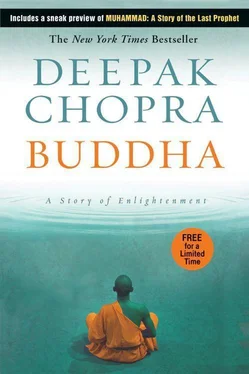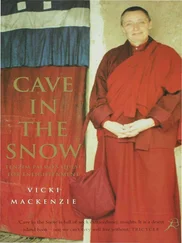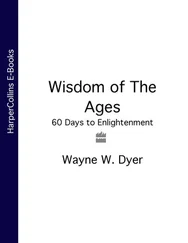“But two seconds ago he was weeping over you. And you were weeping too,” said Assaji awkwardly.
“That was love,” said Buddha. “Love sometimes weeps; don’t be ashamed of it. With some people, an appeal to love prevails.”
“Love didn’t stop him from running back to fight,” said Assaji.
Buddha opened the tent flap. They saw the generals trailing after Suddhodana, who was shouting exhortations the way he used to when he was young. Some of his staff tried to calm him down, but he ferociously threw them off. After a moment the officers mounted their horses or jumped into chariots. Buddha watched them rush off toward the left flank, where some fighting was still raging.
“What if he’s killed?” asked Assaji anxiously. “Aren’t you here to save your father?”
“This is the moment of faith, when nothing seems to work,” said Buddha, beginning to walk after the departing fighters. “Don’t preach faith the way it’s usually preached, to keep people quiet and forbid them to think on their own. That kind of faith is blind, and being blind, it is useless. Call on faith only when the mind has given up.”
“But sometimes it’s right to give up,” Assaji protested.
“No, dear friend, that’s not true. Never forget that all this is a dream.” Buddha passed his gaze over the dead bodies fallen on either side, the carrion birds picking at their remains, the fleeing horses without a rider. “Winning and losing are the same thing. Both are nothing.”
Buddha quickened his pace. Assaji summoned the other monks to catch up. He said, “This is a profound day for us, master. We will never forget it.”
“Every day is like this,” Buddha replied. “You’ll see.”
Now they arrived at the thick of the fray where Suddhodana, against the earnest entreaties of his officers, was standing in his stirrups and screaming. “Come face me, coward! I am one old man, but you won’t walk away alive.”
From the opposing ranks came a stir, then a single horseman rode out into the space between the two armies. It was Devadatta, fully armored with upraised sword. “I would gladly kill you, old fool,” he shouted. “But half your army follows me already. Surrender or watch your men be killed before sunset.”
“Who is he?” asked Assaji.
“I could give you many answers. My cousin. A lost soul. A man trapped in a nightmare,” said Buddha. “But the truth is that he is an aspect of me.”
Raising his voice, Buddha called, “Devadatta!”
His cousin looked his way, but instead of registering surprise he laughed harshly. “Come to see your last hope die?” he cried. “Tell your father to lay down his arms or I’ll take the throne by force.”
Since convincing Suddhodana that his son was dead, Devadatta had spent his time well. He raised dissent among some garrisons of the king’s army, offering them more fighting and gold once Suddhodana was deposed. He plotted with a neighboring king, Bimbisara, to invade the country so that Devadatta would have overwhelming numbers on his side.
“Stop, cousin, for your own sake,” Buddha said, coming nearer. “This is a mistake.”
“Only for your family,” said Devadatta bitterly. “You’ve held me like a prisoner all my life.”
“Revenge isn’t yours,” said Buddha. “Surrender, and I promise you freedom from your pain.”
Devadatta became enraged. “Surrender to you?” he screamed. “You weak, pious fraud!” He swung his sword in a circle overhead and kicked his horse with his spurs to make it charge. On the other side Suddhodana had lost the will to fight. Without warning, he felt his body drained of energy, and he slumped in the saddle like the old man he was.
Prepared to die, Suddhodana closed his eyes and prayed. He had done that only in the Shiva temple before a battle. But he worried about his soul, so he asked Maya to forgive him for letting her die. He thanked the gods for allowing him to live long enough to see his lost son once again. And finally, since he was what he was, the king prayed fervently that Devadatta would die by violence and go directly to hell. When he opened his eyes again, Suddhodana thought that his last prayer had come true because Devadatta was not hard upon him with his sword. Instead, the traitor was rolling in the dust, and his mount had bolted. Confusion broke out in the ranks.
The next instant made matters clear. A lone soldier had run up at the last moment and cut the cinch to Devadatta’s saddle, unhorsing him. That soldier was standing over him now, ripping off his helmet. It was Channa, who shouted at Suddhodana, “Get out of here! I can’t kill a whole army for one old fool.”
Suddhodana backed up until he was safe among the ranks of his men. He watched as Devadatta leaped to his feet. The two fighters circled each other, swords held forward.
“So you still pick fights you can’t lose,” Channa snarled. “Not today. Today, nobody becomes king without going through me.”
Devadatta lunged with his weapon, hoping for a clean kill with his first strike. Channa stepped aside quickly, and his enemy rushed by, almost losing his balance. With an arrogant smile, Channa waved for Devadatta to come at him again.
“Why waste time?” he taunted. “This low-caste scum was always the one who would kill you. I’ll rub a little of my blood in your wounds to make sure you get to hell.”
Devadatta had gained some control over his rage and backed off warily. All this time the five monks stared at Buddha, waiting for him to intervene. “Master, all day you’ve shown us the things we can do,” whispered Assaji. “Why do you stand back now?”
“It only seems that I’m standing back.”
The authority in Buddha’s voice silenced Assaji. Devadatta and Channa continued circling each other, making tentative jabs to see if they could catch the other off guard.
“Their whole lives have come to this moment,” said Buddha. “Yet in an instant a life can be thrown away. Watch how easy it is.” He bent over and picked up a round pebble. With a deft toss he threw it, and the pebble landed behind Devadatta’s right heel. He took his next step backward and slipped on it, stumbling to one knee. Channa’s eyes flashed toward the spectators. He had been so intent on attacking Devadatta that he hadn’t even noticed Buddha among the crowd. His face flushed deep red, but in the same instant he couldn’t stop himself from leaping on his enemy and pressing his sword to Devadatta’s throat. No one would ever know if he intended to give Devadatta a moment’s final mercy because Suddhodana’s voice filled the air. “No! Hold your hand.”
Channa hesitated; he knew if he disobeyed that he would be executed. His mind was confused, having to absorb the fact of Siddhartha’s return at the very moment that he was revenging Siddhartha’s death. Suddhodana came forward.
“You are forbidden to kill him,” he said with command. “Devadatta is still a prince.”
Channa let go of Devadatta’s head and pulled his blade away. He gave a curt bow of obedience. This was the moment his enemy had waited for. Devadatta raised his sword and stabbed Channa in the back. The blade pierced Channa’s aorta, and he crumpled to the ground. Devadatta got to his feet, panting and dripping with sweat. Within seconds, Suddhodana’s men had captured him and hauled him away. The enemy ranks stirred with confusion, then the trumpets sounded and they beat a retreat. Suddhodana gave orders to let them go; without Devadatta to lead them, Bimbisara’s men would sneak back home, and the rebels from Suddhodana’s army had no choice but to follow them into banishment.
The only ones who remained on the field were Buddha and the five monks, who were in shock. “Wasn’t that your friend?” asked Kondana. “You caused him to be killed.”
Читать дальше












